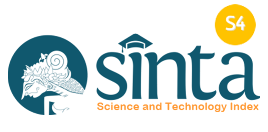ANALYSIS OF ABSORPTION CAPACITY OF LIBRARY SCIENCE ALUMNI OF UIN RADEN FATAH PALEMBANG AND ITS RELEVANCE TO THE CURRICULUM
DOI:
https://doi.org/10.24269/pls.v4i2.3098Abstract
Competition in the Global Era, which is currently getting tighter, demands every institution, especially Higher Education Institutions, to be able to produce alumni in accordance with the demands of the times. The orientation of learning outcomes in tertiary institutions is not seen from the scores obtained, but more than that it is expected that alumni who have graduated in tertiary institutions have the ability based on the internalization of knowledge, attitudes, skills, competencies and accumulated work experience. To find out and measure the quality of higher education institutions, one of which is tracing the tracks of alumni (Tracer Study). So that the evaluation of the competencies produced by higher education becomes an important thing to do so that the world of higher education is not separated and too far from the real world of work in society. To answer these challenges and needs, a library science study program based on KKNI was designed, 75% of which leads to practical work in the library to produce professional librarians. Based on the results of surveys and research, data shows that the waiting period for alumni is more than 50% under 6 months, even 27% of them have got a job before graduating. While the level of relevance / suitability of the course with the work of the alumni respondents, 81% answered very well.
References
From Books
Burhan Nurgiyantoro, Dasar-dasar Pengembangan Kurikulum Sekolah. (Yogyakarta. BPFE, 1988).
Cholid Narbuko, Metodologi Penelitian, (Jakarta: Bumi Aksara, 2007).
E.Mulyasa, Implementasi Kurikulum 2004 Panduan Pembelajaran KBK, (Remaja Rosda Karya; 2005)
Emzir, Metodologi Penelitian Pendidikan: Kuantitatif Dan Kualitatif, Jakarta: Rajawali Press, 2011.
Harkrisyati Kamil. 2005. “Peran Pustakawan dalam Manjemen Pengetahuanâ€. Makalah, Rakerpus dan Seminar Ilmiah IPI XIII Pekanbaru, Riau, 31 Mei - 3 Juni 2005, Pekanbaru: IPI, 2005
Ilah Sailah dkk, Buku Kurikulum Pendidikan Tinggi. Direktorat Pembelajaran dan Kemahasiswaan, Direktorat Pendidikan Tinggi. Jakarta.
Imamudin, Skripsi. Relevansi Kurikulum Jurusan Ilmu Perpustakaan Terhadap Dunia Kerja Alumni Jurusan Ilmu Perpustakaan UIN Jakarta. 2014.
McCook, K. D. L. P. (2009). Opportunities in Library and Information Science Careers. New York: McGraw Hill.
Nana Syaodih Sukmadinata. Pengembangan Kurikulum: Teori dan Praktek. (Bandung, Remaja Rosdakarya. 2007).
Ninis Agustini Damayani. Pengembangan Program Pendidikan S1 dan S2 Ilmu Informasi dan Perpustakaan di Indonesia : Masalah dan Tantangan. Disampaikan pada Lokakarya Pengembangan Program Pendidikan dan Pelatihan Perpustakaan di Indonesia, Jakarta 11-13 Juli 2005.
dkk. Studi Pelacakan Alumni Jurusan PendNi Nyoman Seriati idikan Seni Tari Fakultas Bahasa dan Seni Universitas Negeri Yogyakarta Tahun 2007-2010. (Yogyakarta, UNY 2011).
Saipul Anwar, Metodologi Penelitian Pendidikan, (Palembang: Grafindo Telindo, 2008).
Sudarsono. B, 2009. Pustakawan Cinta dan Teknologi. (Jakarta: Ikatan Sarjana dan Informasi Perpustakaan Indonesia (ISIPII).
Sugiyono. Metode Penelitian Administrasi. (Bandung: Alfabeta.2004).
Sulistyo Basuki, Kurikulum Pendididikan Pustakawan untuk Program Sarjana, Apakah Masih Diperlukan?. (Visi Pustaka. Vol.4 Ed.1. Juni 2002).
Syarif Hidayat, Teori dan Prinsip Pendidikan, (Tangerang: Pustaka Mandiri, 2013)
Teichler U. 1999. Research on the Relationship Between Higher Education and the World of Work: Past Achievements, Problems and New Challenges. Higher Education Vol 38.
Ulifa Rahma, Bimbingan Karier Siswa, (Malang: UIN-Maliki Press, 2010).
Usiono dan Retno. 2018. Faktor-faktor Pendorong Mahasiswa Memilih Program Studi Ilmu Perpustakaan di UIN Sumatera Utara Medan. (LP2M UIN Sumatera Utara Medan).
Yanto dkk. Dokumen Kurikulum Program Studi Ilmu Perpustakaan. (Palembang: Fakultas Adab dan Humaniora UIN RF Plg, 2019).
From Website
http://staff.ui.ac.id/system/files/users/a-syafiq/material/kompetensiyangdibutuhkan dalamduniakerja.pdf
https://forlap.ristekdikti.go.id/prodi/detail/ouqwmuyzotytmdfbos00rju2lufdntytmjlcrdkwqkq4oti3, diakses tanggal 10 Agustus 2020.
Ahmad Syafiq dan Sandra Fikawati, “Kompetensi yang Dibutuhkan dalam Dunia Kerja ; Berdasarkan Tracer Studies FKMUI†Seminar Terbuka “Kompetensi Yang Dibutuhkan Dalam Dunia Kerjaâ€. Diakses pada tanggal 07 Agustus 2020. http://staff.ui.ac.id/system/files/users/a-syafiq/material/kompetensiyangdibutuhkan dalamduniakerja.pdf
Broadbent, M . Education for Information and Library Services. Australian Academic and Research Libraries. 19 (3), 1998.
http://doi.org/10.1080/00048623.1988.10754624.
Christin Septina Basani, Kurikulum Nasional Yang Berbasis Kompetensi Perguruan Tinggi Dengan Mengacu Pada Kerangka Kualifikasi Nasional Indonesia (KKNI) Untuk Menghasilkan Kualitas Manusia Yang Kompeten dan Berdaya Saing. (Lihat www.dikti.go.id, Membumikan Pendidikan. Juli 2014, diakses pada tanggal 05 Mei 2020).
Nashihuddin, W. 2014. Perkembangan Pendidikan Ilmu Perpustakaan Indonesia: Dari Masa ke Masa, 13 (1). http//journal.ipb.ac.id/index.php/jpi/article/view/8771.
Rasiman, Suwarno Widodo, Rina Dwi Setyawati, Penelusuran Alumni (Tracer Study) Program Studi Pendidikan Matematika IKIP PGRI Semarang sebagai Upaya Kajian Relevansi.
https://media.neliti.com/media/publications/176852-ID-penelusuran-alumni-tracer-study-program.pdf. Diakses pada tanggal 25 Mei 2020.
http://journal.unair.ac.id/download-fullpapers-palim3ec16c1d712full.pdf. Diakses pada tanggal 08 April 2020.
http://repository.uinjkt.ac.id/dspace/bitstream/123456789/29539/3/imanudin-fah.pdf. Diakses pada tanggal 09 Mei 2020.
https://media.neliti.com/media/publications/176852-ID-penelusuran-alumni-tracer-study-program.pdf. Diakses pada tanggal 25 Mei 2020.
Perpres Nomor 8 Tahun 2012 Pasal 1 Ayat 1
Downloads
Additional Files
Published
How to Cite
Issue
Section
License
Licence
This Journal will place Author as Copyright Holder, The non-commercial use of the article will be governed by the Creative Commons Attribution license as currently displayed on Creative Commons Attribution-NonCommercial-ShareAlike 4.0 International License.

Author(s)' Warranties
The author warrants that the article is original, written by stated author(s), has not been published before, contains no unlawful statements, does not infringe the rights of others, is subject to copyright that is vested exclusively in the author and free of any third party rights, and that any necessary written permissions to quote from other sources have been obtained by the author(s).
Plagiarism Notice
PUBLIS Editorial board recognizes that plagiarism is not acceptable and therefore establishes the following policy stating specific actions (penalties) upon identification of plagiarism/similarities in articles submitted for publication in PUBLIS. PUBLIS will use Turnitin's originality checking software as the tool in detecting similarities of texts in article manuscripts and the final version articles ready for publication. A maximum of 30% of similarities is allowed for the submitted papers. Should we find more than 30% of the similarity index, the article will be returned to the author for correction and resubmission.

_baru.png)










